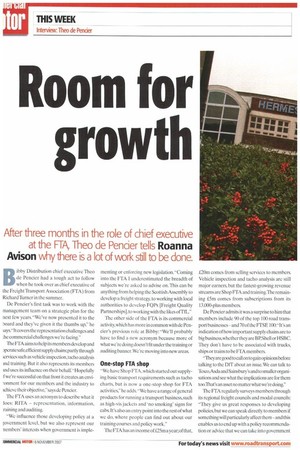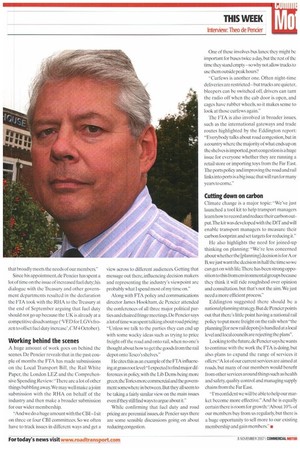Room for growth
Page 26

Page 27

If you've noticed an error in this article please click here to report it so we can fix it.
After three months in the role of chief executive at the FTA, Theo de Pencier tells Roanna
Avison why there is a lot of work still to be done.
Bibby Distribution chief executive Theo de Pencier had a tough act to follow when he took over as chief executive of the Freight Transport Association (FTA) from Richard Turner in the summer.
De Pencier's first task was to work with the management team on a strategic plan for the next few years. "We've now presented it to the board and they've given it the thumbs up," he iays."It covers the representation challenges and the commercial challenges we're facing."
The FTA aims to help its members develop and Jperate safe,efficientsupplychains;partlythrough net-vices such as vehicle inspection, tacho analysis Ind training. But it also represents its members Ind uses its influence on their behalf -Hopefully f we're successful on that front it creates an envi-onment for our members and the industry to ichieve their objective," says de Pencier.
The FTA uses an acronym to describe what it loes: RITA representation, information, raining and auditing.
"We influence those developing policy at a ;overnment level, but we also represent our nembers' interests when government is imple menting or enforcing new legislation. "Coming into the FTA I underestimated the breadth of subjects we're asked to advise on. This can be anything from helping the Scottish Assembly to develop a freight strategy, to working with local authorities to develop FQPs [Freight Quality Partnerships], to working with the likes of TfL."
The other side of the FFA is its commercial activity, which has more in common with de Pencier's previous role at Bibby: -We'll probably have to find a new acronym because more of what we're doing doesn't fit under the training or auditing banner. We're moving into new areas.
One-stop FTA shop
"We have Shop F IA, which started out supplying basic transport requirements such as tacho charts, but is now a one-stop shop for FTA activities," he adds. "We have a range of general products for running a transport business, such as high-vis jackets and 'no smoking' signs for cabs. It's also an entry point into the rest of what we do, where people can find out about our training courses and policy work."
The FTA has an income of f25m a year;of that, £20m comes from selling services to members. Vehicle inspection and tacho analysis are still major earners, but the fastest-growing revenue streams are Shop FTA and training.The remaining £5m comes from subscriptions from its 13,000-plus members.
De Pencier admits it was a surprise to him that members include 90 of the top 100 road transport businesses -and 70 of the FUSE 100:"It's an indication of how important supply chains are to big busins,whether they are BP,Shell or HSBC They don't have to be associated with trucks, ships or trains to be FTA members.
"They are good to call on to gain opinions before talking to the DfT about an issue. We can talk to Tesco,Asda and Sainsbury's and to smaller organisations and see what the implications are for them too.That's an asset no matter what we're doing," The FTA regularly surveys members through its regional freight councils and modal councils: "They give us great responses to developing policies, but we can speak directly to members if something will particularly affect themand this enables us to end up with a policy recommendation or advice that we can take into government that broadly meets the needs of our members."
Since his appointment, de Pencier has spent a lot of time on the issue of increased fuel duty; his dialogue with the Treasury and other government departments resulted in the declaration the FIA took with the RHA. to the Treasury at the end of September arguing that fuel duty should not go up because the UK is already at a competitive disadvantage ('VED for LGVs frozen to offset fuel duty increase', CM 4 October).
Working behind the scenes A huge amount of work goes on behind the scenes. De Pencier reveals that in the past couple of months the ETA has made submissions on the Local Transport Bill, the Rail White Paper, the London LEZ and the Comprehensive Spending Review:—There are a lot of other things bubbling away. We may well make a joint submission with the RHA on behalf of the industry and then make a broader submission for our wider membership.
"And we do a huge amount with the CBI— I sit on three or four CBI committees. So we often have to track issues in different ways and get a view across to different audiences. Getting that message out there, influencing decision makers and representing the industry's viewpoint are probably what I spend most of my time on."
Along with ETA policy and communications director James Hookh am, de Pencier attended the conferences of all three major political parties and chaired fringe meetings. Dc Pencier says a lot of time was spent talking about road pricing: "Unless we talk to the parties they can end up with some wacky ideas such as trying to price freight off the road and onto rail, when no one's thought about how to get the goods from the rail depot ontoTesco's shelves."
He cites this as an example of the ETA influencing at grass root level:"I expected to find major differences in policy, with the Lib Dems being more green, theTories more commercial and the government somewhere in between. But they all seem to be taking a fairly similar view on the main issues even if they still find ways to argue about it."
While confirming that fuel duty and road pricing are perennial issues, de Pencier says there are some sensible discussions going on about reducing congestion. One of these involves bus lanes: they might be important for buses twice a day but the rest of the time they stand empty—so why not allow trucks to use them outside peak hours?
"Curfews is another one. Often night-time deliveries are restricted —but trucks are quieter, bleepers can be switched off, drivers can turn the radio off when the cab door is open, and cages have rubber wheels, so it makes sense to look at those curfews again."
The FTA is also involved in broader issues, such as the international gateways and trade routes highlighted by the Eddington report: "Everybody talks about road congestion, but in a country where the majority of what ends up on the shelves is imported,port congestion is a huge issue for everyone whether they are running a retail store or importing toys from the Far East. The ports policy and improving the road and rail links into ports is a big issue that will run for many years to come."
Cutting down on carbon
Climate change is a major topic: "We've just launched a tool kit to help transport managers learn how to record and reduce their carbon output.The kit was developed with the DIT and will enable transport managers to measure their carbon footprint and set targets for reducing it."
He also highlights the need for joined-up thinking on planning: "We're less concerned about whether the [planning] decision is for A or B, we just want the decision in half the time so we can get on with life. There has been strong opposition to this from environmental groups because they think it will ride roughshod over opinion and consultation, but that's not the aim. We just need a more efficient process."
Eddington suggested there should be a national planning strategy.But de Pencier points out that there's little point having a national rail policy to put more freight on the rails when "the planning [for new rail depots] is handled at a local level and local councils are rejecting the plans".
Looking to the future,de Pencier says he wants to continue with the work the ETA is doing, but also plans to expand the range of services it offers:"A lot of our current services are aimed at roads, but many of our members would benefit from other services around things such as health and safety, quality control and managing supply chains from the Far East.
"I'm confident we will be able to help our market become more effective." And he is equally certain there is room for growth: "About 10% of our members buy from us regularly, but there is a huge opportunity to sell more to our existing membership and gain members."•






















































































































































































